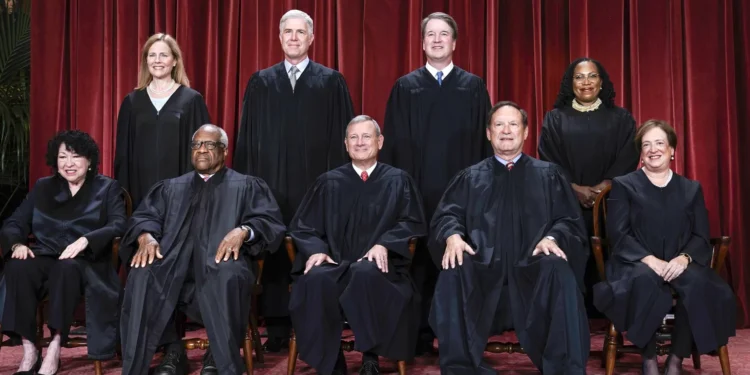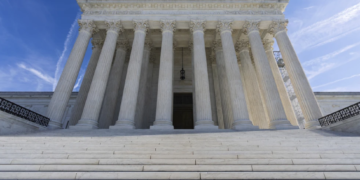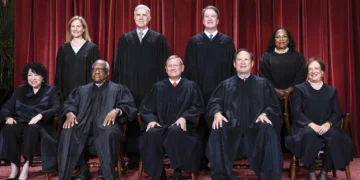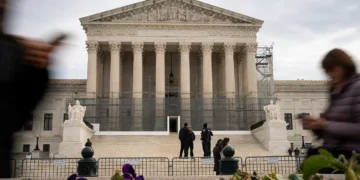March 25, 2025 Story by: Publisher
The Supreme Court on Monday wrestled with whether to leave in place Louisiana’s congressional map that was used in the 2024 elections and includes two majority-Black districts.
The dispute is the latest involving claims of racial gerrymandering and the drawing of political districts to land before the high court following the recrafting of voting boundaries after the decennial census. In this case, the plaintiffs, who identify themselves as non-African American Louisiana residents, say the state relied too heavily on race when drawing a second majority-Black district for the state’s congressional map.
It was unclear following arguments whether the high court was inclined to preserve Louisiana’s map for use in future elections. New district lines are drawn after every Census.
The justices have in recent years weakened the Voting Rights Act, starting with the landmark 2013 decision that gutted the law’s preclearance requirement. Before that decision, certain states and localities — mostly Southern — with a history of racially discriminatory voting practices were required to submit changes in election law to the Justice Department for approval before they could be implemented. The court ruled that the formula used by the Voting Rights Act to determine what states and localities were subject to Section 5 was unconstitutional because it was based on electoral conditions in the 1960s and 1970s, rather than on contemporary circumstances, and thus imposed unequal burdens on some states without sufficient justifying evidence.
But in a surprising decision in 2023, the high court declined an invitation to reshape Section 2 of the landmark voting law and invalidated Alabama’s congressional map drawn by Republican lawmakers after the 2020 Census.
The latest case before the court involves Louisiana’s congressional map, which was redrawn last year to add a second majority-Black district to comply with Section 2, but then was found to be a racial gerrymander that violated the 14th Amendment’s Equal Protection Clause.
Section 2 of the Voting Rights Act prohibits voting practices that discriminate on the basis of race.
“What we’re looking at is the decision on how you draw districts to comply with the VRA and at the same time, not violate the 14th Amendment’s ban on drawing districts based on race, where race is used excessively,” said Jeffrey Wice, a professor at New York Law School who is an expert in redistricting.
The dispute, he said, “is a conflict of different issues coming to us at a time when the court is highly politicized.”
The case, known as Louisiana v. Callais, has ping-ponged around the federal courts, including twice at the Supreme Court, since 2022, when a federal district court in Baton Rouge issued the first decision in this long-running dispute. The judge, Shelly Dick, found the original map of Louisiana’s six congressional districts that was enacted by the legislature in February 2022 likely violated Section 2 because it diluted Black voting strength.
That initial map from the GOP-led legislature had one majority-Black district. African-Americans make up nearly one-third of Louisiana’s population.
The judge blocked the state from conducting congressional elections under those lines and ordered the state to put in place a remedial plan with two majority-Black House districts. A federal appeals court then upheld that injunction and set a deadline for Louisiana to draw the new voting lines.
Republican Gov. Jeff Landry, who took office in January 2024, called the legislature into special session to draw a new congressional map, with the understanding from state lawmakers that two of its six districts had to be majority-Black.
The plan adopted reconfigured Louisiana’s 6th Congressional District to adhere to the district court’s order and bring the map into compliance with the Voting Rights Act, state officials said. But Louisiana state lawmakers said they had another goal: to protect certain Republican incumbents, namely House Speaker Mike Johnson, Majority Leader Steve Scalise, and Rep. Julia Letlow, the only woman in the state’s congressional delegation and a member of the powerful Appropriations Committee, they said.
It did that at the expense of Garrett Graves, a Republican who represented District 6 and was at risk of losing his seat because of the redrawn lines. The new district has a Black voting age population of roughly 51%. It stretches from Shreveport, in Louisiana’s northwest corner, to Baton Rouge, in the southeast, and connects predominantly Black populations from Shreveport, Alexandria, Lafayette and Baton Rouge.
Shortly after the new redistricting plan was adopted, a group of 12 self-described “non-African-American voters” sued the state and alleged that the redrawn District 6 was a racial gerrymander in violation of the Equal Protection Clause.
A divided three-judge district court panel in Shreveport found that the legislature predominantly considered race when it crafted the new voting lines and blocked the state from using the map in any election. But Louisiana lawmakers, along with a group of Black voters and nonprofits who challenged the original map from 2022, asked the Supreme Court to intervene and allow the state to use the plan for the 2024 elections.
The Supreme Court granted the state and Black voters’ emergency relief, and the November House elections were held using the redrawn map. Graves opted not to seek reelection, and Rep. Cleo Fields, a Democrat who is Black, won the race for District 6. The high court agreed to take up the case in November.
“The court has faced this issue several times before,” Wice said. “But here we have a uniquely different case because we’re looking at Louisiana trying to do three things.”
The first is to comply with the courts, the second is to draw a second minority district that would allow Black voters to elect their preferred candidate, and the third is to satisfy political demands to keep certain members of Congress in office, he said.
In filings with the Supreme Court, Louisiana officials argue that the non-Black voters who challenged the new congressional map did not have the legal right to sue, a concept known as standing, because they failed to show how they were harmed by the alleged violation of the Constitution’s Equal Protection Clause.
But as to the merits of the case, the state and voters said race was not the sole factor involved in how the map was redrawn. Instead, Louisiana lawmakers said they had two criteria: that District 6 be majority-Black and that the broader congressional map protects Republican incumbents.
The state said the blame for its considerations of race when drawing the new map lies with the district court since it said the remedial redistricting plan had to have two majority-Black districts to comply with the federal voting rights law.
“Having forced the state into adopting a second majority-Black district, the federal judiciary cannot wash its hands of the matter now and point at the legislature,” Louisiana officials said. “If a bank robber holds a gun to a teller’s head, no one would say that the teller’s emptying the cash drawer was self-motivated. Just so here.”
But during the arguments, Justice Neil Gorsuch questioned how the high court is supposed to reconcile the state’s acknowledgment that it took race into consideration to ensure compliance with the Voting Rights Act with the 14th Amendment’s Equal Protection Clause.
“How do we square that with the 14th Amendment’s promise that race should play no role [in our laws]?” he asked.
Chief Justice John Roberts also highlighted the shape of District 6, which he said runs from one corner of the state to another, “picking up Black populations as it goes along.”
But several of the liberal justices appeared to support Louisiana’s argument that it was motivated by politics when it drew the lines of District 6, and decided to draw its own map to protect incumbent lawmakers rather than continue with litigation and risk the district court implementing its own voting lines.
Justice Elena Kagan said state lawmakers had good reason to create a second majority-minor district, given the lower court’s order, and implemented a map that reflected its political considerations.
“If the state can’t do that, the state has no breathing room” when drawing voting boundaries, she said.
In their filings, Louisiana officials asked the Supreme Court to provide a “clear articulation” of what voting map would survive review under the Constitution and the Voting Rights Act, and how states can avoid “endless litigation” that follows every Census moving forward.
They also suggested that the Supreme Court rule that racial gerrymandering claims shouldn’t be decided by the courts at all and should instead be left to the political branches. The proposal, which Louisiana officials said “would be the best outcome for everyone,” reflects a concurring opinion from Supreme Court Justice Clarence Thomas last year in a redistricting case from South Carolina.
“Drawing political districts is a task for politicians, not federal judges,” Thomas wrote. “There are no judicially manageable standards for resolving claims about districting, and, regardless, the Constitution commits those issues exclusively to the political branches.”
No other justice joined Thomas’ opinion, and his view was not raised during the arguments. But whether any other of the other justices, namely the members of its conservative wing, come out in agreement with Thomas in this case remains an open question.
Sarah Brannon, deputy director of the ACLU’s Voting Rights Project, said during a call with reporters that if at least four other justices embrace Thomas’ position, it would set a bad precedent going forward.
“It would make it very difficult for civil rights groups, minority voters, to bring claims in the future to raise concerns that state legislatures are using race in a way that is intended not to help Black voters have more opportunities to elect candidates of choice, or voters of color to have opportunities to elect candidates of choice, but to essentially manipulate race in such a way that would deprive voters,” she said.
On the other side, the group of 12 non-African-American voters argued that the state set a “racial quota” of two majority-Black districts out of the state’s six House seats.
District 6, they argued in Supreme Court filings, is a “sinuous and jagged second majority-Black district based on racial stereotypes, racially ‘balkanizing’ a 250-mile swath of Louisiana, from the far Northwest near Texas, down to [East Baton Rouge] near the Mississippi River’s mouth.”
They also rejected the state’s suggestion that the drawing of district lines be solely left to the political branches.
“The state’s ‘odious’ stereotyping of citizens based on race (even to the ‘shame’ of many legislators and to Republicans’ political detriment) and its tenacious efforts to freeze the gerrymander for the 2024 election show why the political process is insufficient to protect citizens against invidious discrimination,” the voters said.
A decision from the Supreme Court is expected by the end of June.
Source: CBS News
















